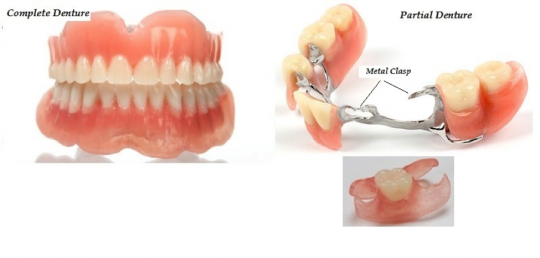
What are dentures?
A Denture is a removable appliance which replaces one or more missing teeth and its surrounding tissues. There are basically two types of dentures, complete dentures and partial dentures.
Complete Denture – A complete denture replaces all the teeth and its associated structures. These are made up of an acrylic(plastic) base with either acrylic or porcelain teeth. They are held in place by forming a suction on the gums. Complete dentures can also be held in place by dental implants which screw into place. This is more secure and like natural teeth.
Partial Denture – A partial denture replaces one or more missing teeth and associated structures. They can be made up of acrylic or cast metal. They are held in place by metal clasps that hold onto the remaining teeth.
Immediate Denture – Is a complete denture which is given on the same day as the extraction (removal) of all the teeth. The advantage of this denture is that the patient does not have to go without teeth. After a few months as the bone and surrounding tissues heal the denture will need some relining to make it tighter.
Flipper – A flipper is a partial denture which is temporary. This type is used to allow for healing time before a more permanent appliance. This is made of plastic and is less expansive.
Indications of dentures
- When a full arch of teeth is missing.
- When one or more teeth are missing and other options like dental implants and bridge are not possible.
Advantages of Dentures:
- Chewing ability – By replacing a lost tooth or teeth helps it helps to chew food better. It also reduces the stress on other natural teeth.
- Aesthetics – Dentures give support to lips and cheeks thus giving a natural appearance to the face. Replacing a missing front tooth can boost the confidence of a person.
- Talking – Helps in better talking and pronouncing of sounds.
- Cost-effective – They are the most cost-effective treatment option for a missing tooth or teeth.
Disadvantages of Dentures:
- They are a removable appliance not fixed.
- They need to be removed and cleaned regularly.
- Patients with bone loss sometimes have loose fitting dentures.
- For most patients, there an adjustment period where they need to learn to eat and speak with their new dentures.
- Most dentures will need adjustments as the patients wears them and starts to notice some sore spots.
How to take care of Dentures:
- Dentures should be given the same carful cleansing as natural teeth. They should be cleaned with a tooth brush twice a day and kept in a clean container of water when not being used. There are Denture cleansing tablets which can be used as requires for a more thorough cleaning.
- Use a soft bristle toothbrush or denture brush and a non-abrasive cleanser to gently brush all surfaces so they do not get scratched.
- Sometimes denture wearers may have to use adhesives to help keep dentures in place. They come in many forms such as creams, powder and strips. They come with instructions and should be strictly followed.
- While handling the dentures keep a towel beneath just in case it is dropped. Dentures can break if dropped.
- Brush your gums, palate and tongue with a soft bristle brush on a regular basis to stimulate the circulation of your tissues and to remove plaque.
- If the denture breaks, chips, cracks or becomes loose bring them to a dentist don’t try to repair them yourself.
